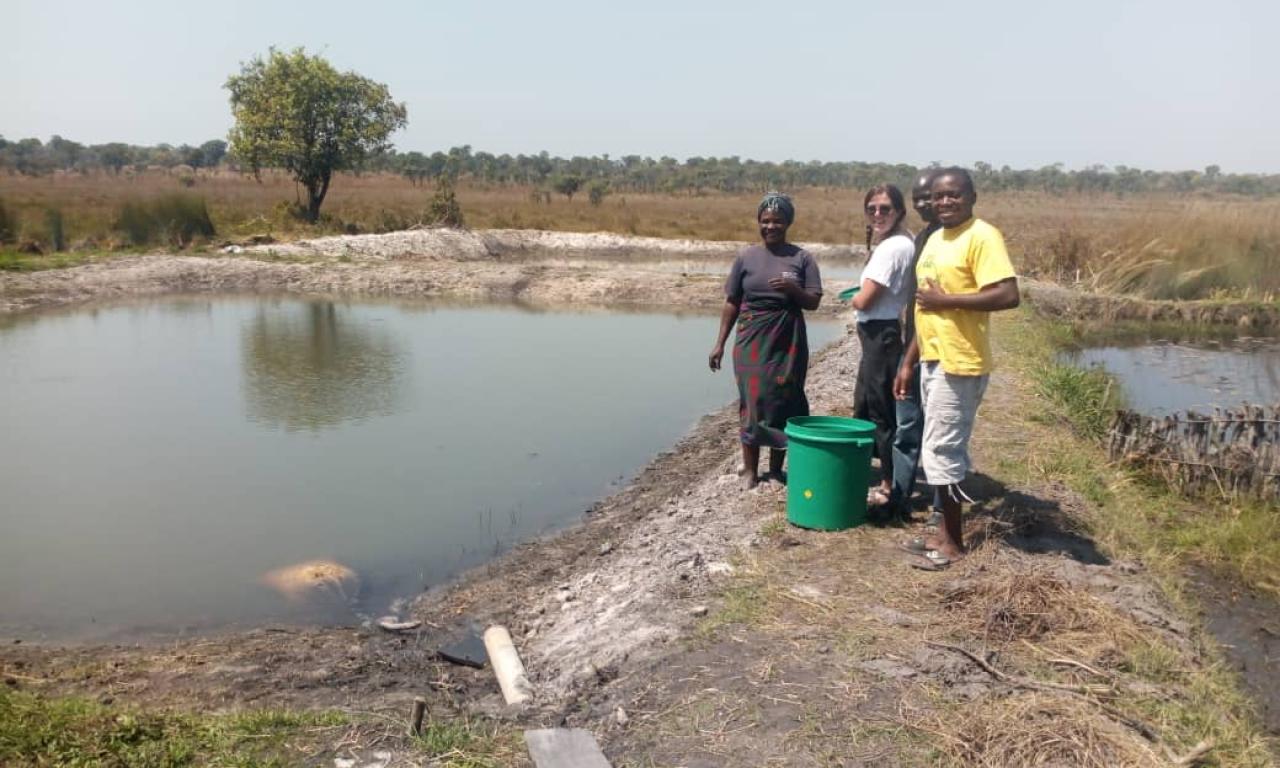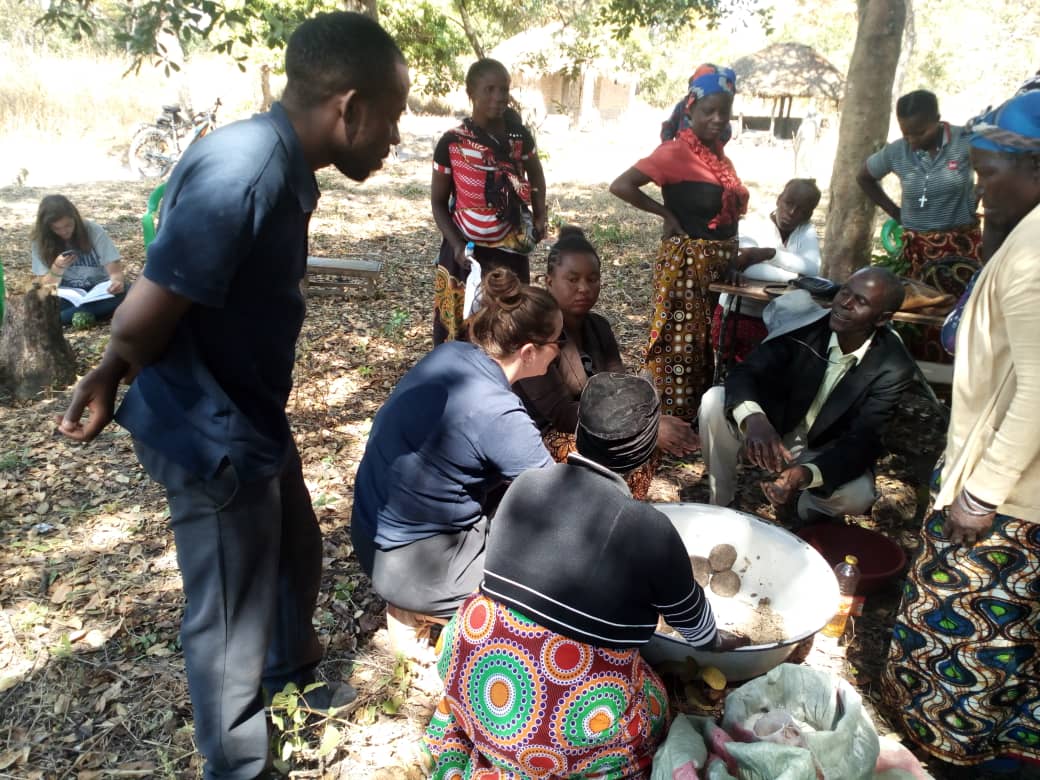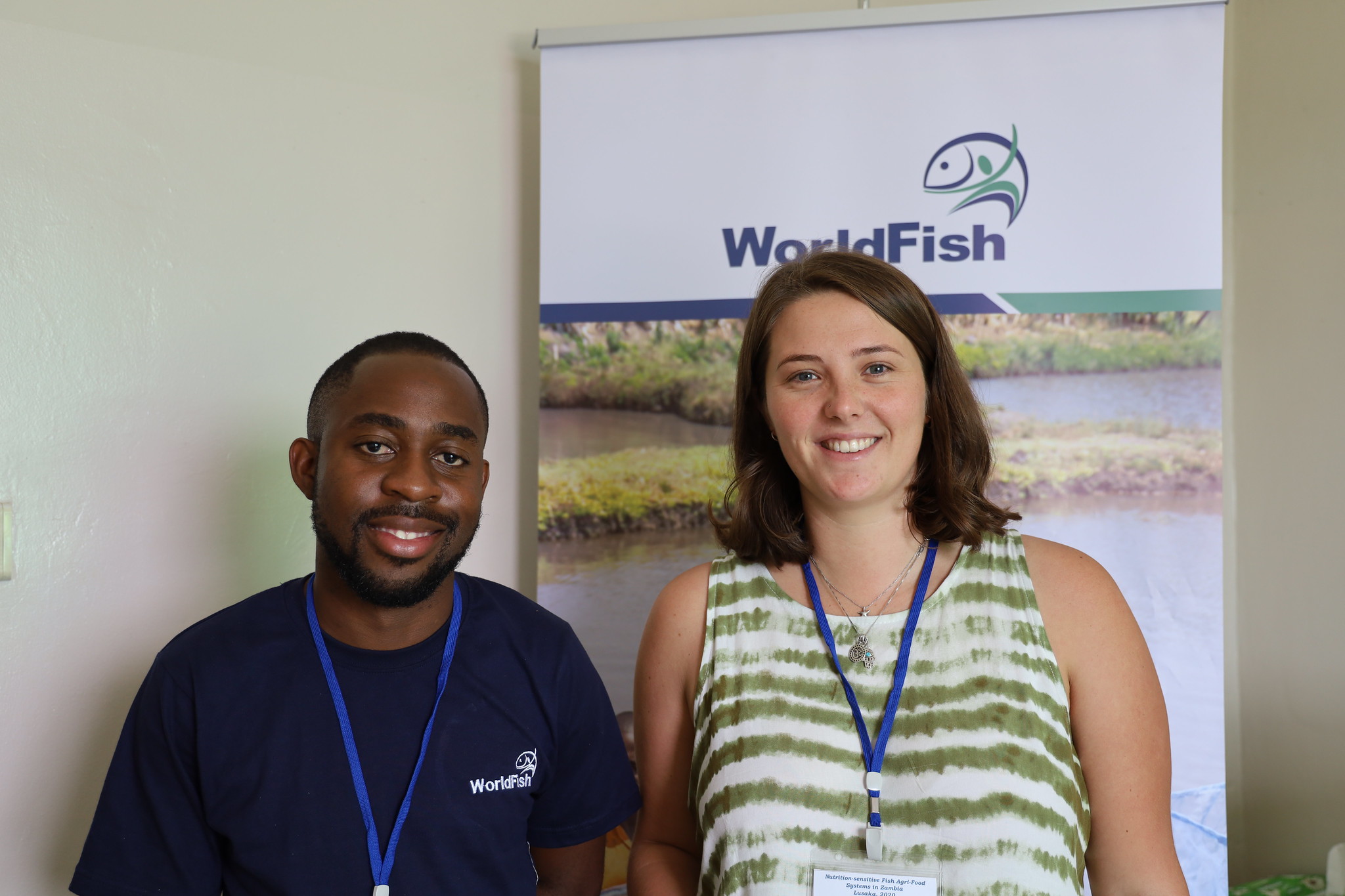
“I was called the white devil,” laments Lucinda ‘Lulu’ Middleton as we talked about her experience of working in the rural area of Luwingu in the Northern Province of Zambia. “For weeks, Muleya had to lead the conversation and discussions while I had to take a back seat and be a silent observer. Thankfully, things have changed now,” as she refers to her fellow teammate, Muleya Syapwapa. Lulu and Muleya are two WorldFish interns employed to pilot the nutrition-sensitive pond polyculture project in Luwingu, a rural area approximately 14 hours drive away from the capital city of Lusaka.
As with many pilot projects and trials, the first few weeks were the hardest as they challenge existing norms and practices within the target communities. Lulu was branded the ‘white devil’, following the dissatisfaction from several members of households that were not selected to be part of the pilot project. Aside from the discrimination of Lulu being a white woman, she was also chastised because WorldFish, unlike other organizations, did not provide immediate financial or food aid to the community. Instead, Lulu and Muleya’s objectives were focused on training and transforming the women farmers’ livelihoods through pond polyculture technology.
The first barrier faced was that the project did not conform to the traditional practices, stereotypes and gender norms within the community. Men own most of the land and farms in the village, and they are seen as the breadwinner and providers for the household. Women are perceived as homemakers and hence do not hold opinions or make decisions regarding land and farming. The pond polyculture technology, as part of the nutrition-sensitive fish agri-food systems approach, seeks to improve access to nutritious and livelihoods of vulnerable communities, especially for women, through the introduction of small indigenous fish species into traditional monoculture ponds. In addition, the project aims to empower women and youth to become engaged with aquaculture production and to make decisions with regard to household income and food distribution within the household.
However, it is never easy to break age-old norms that center upon the patriarchal system. When Lulu and the team first engaged with women farmers on the ground, they very soon realized that construction and management of the ponds were done by the husbands, while the women did not have much participation over the ponds. While some women do participate, they will eventually relinquish their control of the ponds back to their husbands or other men within the household. The women did not get to decide on harvesting, processing, consumption or sale of the fish from the ponds; nor on the use of the income from the fish sale for buying nutritious foods. Lulu and the team challenged the traditional norms by teaching the women to construct their own ponds, stock, cultivate and harvest the small fish for consumption – for their own and their children’s consumption, and also for sale. Eventually, 14 women took full ownership of their homestead ponds and adopted the pond polyculture technology; and it was scaled up to 50 women by the end of the project. There was also a noticeable shift in the attitudes and behavior of the men, as later interviews revealed that most men became fully committed and supportive of the women’s initiative to manage their homestead ponds for pond polyculture.

The ability to generate extra income from pond polyculture had also affected livelihood decisions among several women in Luwingu. Lulu shared a story of how the adoption of pond polyculture changed the life of a widow and her children living in the village. The widow was planning to remarry in order to find support for herself and her children. However, following her participation in the pilot project, she soon abandoned the plan as she had become self-reliant. Her pond eventually provided her with food and income, thereby eliminating her need to depend on a man for her family’s livelihood. She even employed several youths, at different times, to help her manage her pond.
Another interesting story shared showed how pond polyculture intervention had helped to prevent a teenage girl from being married off to a man, almost twice her age. Girls in the village have fewer opportunities to be educated or for work as compared to boys; and teenage brides are not uncommon. However, with the income and knowledge obtained from pond polyculture, the girl’s parents felt empowered and refused to marry their daughter to the suitor. They also became determined to have their daughter receive a better education and improve the prospects for her future.
The training and group discussion sessions also opened the eyes of the WorldFish team to the different attitudes and barriers limiting gender equity and equality in Luwingu. In a session attended by participants from both genders, the team realized that the women became silent observers while the men dominated most of the discussions. However, in a separate all-female discussion session, the team observed that the women’s participation was more active and they voiced their opinions and ideas, without fear of repercussions. Thus, aside from providing training, the WorldFish team also realized that these discussion sessions also served as a platform and safe space for the women to come together, voice their thoughts and share ideas without judgment from men.

The pilot project came to a close in March 2020, but it was not the end for pond polyculture in the villages of Luwingu. A few women from the pilot phase had come together to form a cooperative and developed a pond for fish stocking and seedling distribution. These women also perform double duty as trainers and resource persons for other women farmers who are interested to implement pond polyculture in their homestead ponds and farms. The project had also generated interest from other development agencies, and the German Development Agency (GiZ) had sent a team to Luwingu to learn and replicate the approach in the Luapula Province. The WorldFish team had created a spark, and through partnerships with other projects and full community support and engagement, a paradigm shift in gender and culture norms, benefiting women of Zambia can occur.
This is not the only positive change that had happened through the project. “We will feel safer being back in the village in Luwingu as compared to staying here in Lusaka”, said Lulu as we were discussing safe relocation plans, following riots that were happening across Zambia in February 2020. Lulu and Muleya were acknowledged as part of the village community, a far cry from the first few weeks when Lulu was labeled the ‘white devil’.
N.B. Lulu Middleton is now back home, safely in the United Kingdom, following her evacuation from Zambia, amidst the COVID-19 pandemic. Muleya Syapwaya is also home safely in Kafue. Their one-year stint for the project had brought significant change to themselves as individuals, and to the community in Luwingu. They are now pursuing further studies related to aquatic food systems.
Pond polyculture is one of the methodologies employed through the nutrition-sensitive fish agri-food systems approach as means to improve food and nutrition security and livelihoods in vulnerable communities. The ‘Managing Aquatic Agricultural Systems to Improve Nutrition and Livelihoods in Selected Asian and African Countries: Scaling Learning from IFAD-WorldFish Collaboration in Bangladesh’ was a three-year project, funded by the International Fund for Agricultural Development (IFAD) and the European Union, and implemented in Cambodia and Zambia. This work was undertaken as part of the CGIAR Research Program on Fish Agri-Food Systems (FISH).
